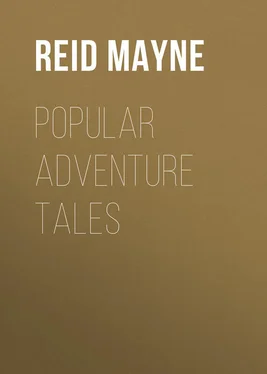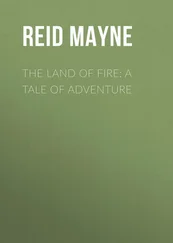Mayne Reid - Popular Adventure Tales
Здесь есть возможность читать онлайн «Mayne Reid - Popular Adventure Tales» — ознакомительный отрывок электронной книги совершенно бесплатно, а после прочтения отрывка купить полную версию. В некоторых случаях можно слушать аудио, скачать через торрент в формате fb2 и присутствует краткое содержание. Жанр: literature_19, foreign_antique, foreign_prose, foreign_children, на английском языке. Описание произведения, (предисловие) а так же отзывы посетителей доступны на портале библиотеки ЛибКат.
- Название:Popular Adventure Tales
- Автор:
- Жанр:
- Год:неизвестен
- ISBN:нет данных
- Рейтинг книги:3 / 5. Голосов: 1
-
Избранное:Добавить в избранное
- Отзывы:
-
Ваша оценка:
- 60
- 1
- 2
- 3
- 4
- 5
Popular Adventure Tales: краткое содержание, описание и аннотация
Предлагаем к чтению аннотацию, описание, краткое содержание или предисловие (зависит от того, что написал сам автор книги «Popular Adventure Tales»). Если вы не нашли необходимую информацию о книге — напишите в комментариях, мы постараемся отыскать её.
Popular Adventure Tales — читать онлайн ознакомительный отрывок
Ниже представлен текст книги, разбитый по страницам. Система сохранения места последней прочитанной страницы, позволяет с удобством читать онлайн бесплатно книгу «Popular Adventure Tales», без необходимости каждый раз заново искать на чём Вы остановились. Поставьте закладку, и сможете в любой момент перейти на страницу, на которой закончили чтение.
Интервал:
Закладка:
“ Parbleu ! brother, you should have been cook to Lucullus. Well, I'll catch the fish for you.”
So saying, François took a fish-hook and line out of his pouch, and fixing a large grasshopper upon the hook, stepped forward to the edge of the water, and cast it in. The float was soon seen to bob and then sink, and François jerked his hook ashore with a small and very pretty fish upon it of a silver hue, with which the lake and the waters running into it abound. Lucien told him it was a fish of the genus Hyodon . He also advised him to bait with a worm, and let his bait sink to the bottom, and he might catch a sturgeon, which would be a larger fish.
“How do you know there are sturgeon in the lake?” inquired François.
“I am pretty sure of that,” answered the naturalist; “the sturgeon is found all round the world in the northern temperate zone – both in its seas and fresh waters; although, when you go farther south into the warmer climate, no sturgeons exist. I am sure there are some here, perhaps more than one species. Sink your bait for the sturgeon is a toothless fish, and feeds upon soft substances at the bottom.”
François followed the advice of his brother, and in a few minutes he had a “nibble,” and drew up and landed a very large fish, full three feet in length. Lucien at once pronounced it a sturgeon, but of a species he had not before seen. It was the Acipenser carbonarius , a curious sort of fish found in these waters. It did not look like a fish that would be pleasant eating; therefore François again took to bobbing for the silver fish which, though small, he knew to be excellent when broiled.
“Come,” said Basil, “I must furnish my quota to this famous dinner that is to be. Let me see what there is on the island in the way of game;” and shouldering his rifle, he walked off among the trees.
“And I,” said Norman, “am not going to eat the produce of other people's labour without contributing my share.”
So the young trader took up his gun and went off in a different direction.
“Good!” exclaimed Lucien, “we are likely to have plenty of meat for the dinner. I must see about the vegetables;” and taking with him his new-made vessel, Lucien sauntered off along the shore of the islet. François alone remained by the camp and continued his fishing. Let us follow the plant-hunter, and learn a lesson of practical botany.
Lucien had not gone far, when he came to what appeared to be a mere sedge growing in the water. The stalks or culms of this sedge were full eight feet high, with smooth leaves, an inch broad, nearly a yard in length, and of a light green colour. At the top of each stalk was a large panicle of seeds, somewhat resembling a head of oats. The plant itself was the famous wild rice so much prized by the Indians as an article of food, and also the favourite of many wild birds especially the reed-bird or rice-bunting. The grain of the zizania was not yet ripe, but the ears were tolerably well filled, and Lucien saw that it would do for his purpose. He therefore waded in, and stripped off into his vessel as much as he wanted.
“I am safe for rice-soup, at all events,” soliloquised he, “but I think I can do still better;” and he continued on around the shore, and shortly after struck into some heavy timber that grew in a damp, rich soil. He had walked about an hundred yards farther, when he was seen to stoop and examine some object on the ground.
“It ought to be found here,” he muttered to himself; “this is the very soil for it – yes, here we have it!”
The object over which he was stooping was a plant, but its leaves appeared shrivelled, or rather quite withered away. The upper part of a bulbous root, however, was just visible above the surface. It was a bulb of the wild leek. The leaves, when young, are about six inches in length, of a flat shape and often three inches broad; but, strange to say, they shrivel or die off very early in the season – even before the plant flowers, and then it is difficult to find the bulb.
Lucien, however, had sharp eyes for such things; and in a short while he had rooted out several bulbs as large as pigeons' eggs, and deposited them in his birchen vessel. He now turned to go back to camp, satisfied with what he had obtained. He had the rice to give consistency to his soup, and the leek roots to flavour it with. That would be enough.
As he was walking over a piece of boggy ground his eye was attracted to a singular plant, whose tall stem rose high above the grass. It was full eight feet in height, and at its top there was an umbel of conspicuous white flowers. Its leaves were large, lobed, and toothed, and the stem itself was over an inch in diameter, with furrows running longitudinally. Lucien had never seen the plant before, although he had often heard accounts of it, and he at once recognised it from its botanical description. It was the celebrated “cow parsnip.” Its stem was jointed and hollow, and Lucien had heard that the Indians called it in their language “flute stem,” as they often used it to make their rude musical instruments from, and also a sort of whistle or “call,” by which they were enabled to imitate and decoy several kinds of deer. But there was another use to which the plant was put, of which the naturalist was not aware. Norman who had been wandering about, came up at this moment, and seeing Lucien standing by the plant, uttered a joyful “Hulloh!”
“Well,” inquired Lucien, “what pleases you, coz?”
“Why, the flute-stem, of course. You talked of making a soup. It will help you, I fancy.”
“How?” demanded Lucien.
“Why, the young stems are good eating, and the roots, if you will; but the young shoots are better. Both Indians and voyageurs eat them in soup, and are fond of them. It's a famous thing, I assure you.”
“Let us gather some, then,” said Lucien; and the cousins commenced cutting off such stems as were still young and tender. As soon as they had obtained enough, they took their way back to the camp. Basil had already arrived with a fine prairie hen which he had shot, and Sandy had brought back a squirrel; so that, with François's fish, of which a sufficient number had been caught, Lucien was likely to be able to keep his promise about the dinner.
François, however, could not yet comprehend how the soup was to be boiled in a wooden pot; and, indeed, Basil was unable to guess. Norman, however, knew well enough, for he had travelled through the country of the Assinoboil Indians, who take their name from this very thing. He had also witnessed the operation performed by Crees, Chippewas, and even voyageurs, where metal or earthen pots could not be obtained.
On the next day the mystery was cleared up to Basil and François. Lucien first collected a number of stones – about as large as paving-stones. He chose such as were hard and smooth. These he flung into the cinders, where they soon became red-hot. The water and meat were now put into the bark pot, and then one stone after another, – each being taken out as it got cooled, – until the water came to a fierce boil. The rice and other ingredients were added at the proper time, and in a short while an excellent soup was made. So much, then, for the soup, and the boiled dishes with vegetables. The roast, of course, was easily made ready upon green-wood spits, and the “game” was cooked in a similar way. The fish were broiled upon the red cinders, and eaten, as is usual, after the soup. There were no puddings or pies, though, no doubt, Lucien could have made such had they been wanted.
In their place there was an excellent service of fruit. There were strawberries and raspberries, one sort of which found wild in this region is of a most delicious flavour. There were gooseberries and currants; but the most delicious fruit, and that which François liked best, was a small berry of a dark blue colour, not unlike the huckleberry, but much sweeter and of higher flavour. It grows on a low bush or shrub with ovate leaves; and this bush when it blossoms is so covered with beautiful white flowers, that neither leaves nor branches can be seen. There are no less than four varieties of it known, two of which attain to the height of twenty feet or more. The French Canadians call it “le poire,” but in most parts of America it is known as the “service-berry,” although several other names are given to it in different districts. Lucien informed his companions, while they were crushing its sweet purplish fruit between their teeth, that its botanical name is Amelanchier .
Читать дальшеИнтервал:
Закладка:
Похожие книги на «Popular Adventure Tales»
Представляем Вашему вниманию похожие книги на «Popular Adventure Tales» списком для выбора. Мы отобрали схожую по названию и смыслу литературу в надежде предоставить читателям больше вариантов отыскать новые, интересные, ещё непрочитанные произведения.
Обсуждение, отзывы о книге «Popular Adventure Tales» и просто собственные мнения читателей. Оставьте ваши комментарии, напишите, что Вы думаете о произведении, его смысле или главных героях. Укажите что конкретно понравилось, а что нет, и почему Вы так считаете.












